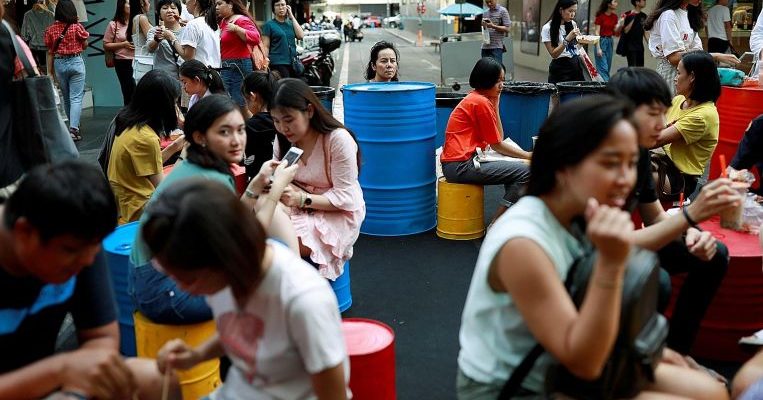
Millions of Thais are enjoying a shopping spree thanks to an economic stimulus measure that has given every adult 1,000 baht (S$45) to be spent within the country by the end of the year.
The Chim Shop Chai (Eat, Shop, Spend) programme is part of the 14 billion baht package implemented in August in the wake of the weakest economic growth in five years.
Its first phase involved giving 10 million citizens aged 18 and above an electronic wallet containing 1,000 baht. The cash has to be spent on food, transport, household items, spa services and hotel stays at any participating establishment across the country except the province where they are registered as residents, as a way of giving the flagging tourism industry a boost.
But they first had to stay up late, sometimes on consecutive nights, as the online registration for the programme began at midnight for 10 days between late September and early October. One million people filled the daily quota within a few hours each night.
“I had to wait for a long time and it was always full each night I tried,” said 21-year-old university student Theerapong Phota, adding: “I want to travel around Thailand.”
Teacher Galaya Wongsaard, 57, said: “I didn’t think I would get it, and I gave up after the third try. But to my surprise, I got an SMS the following morning notifying me that I had registered successfully.”
Ms Galaya, who is a registered resident of Ayutthaya, used her money to buy household items such as toilet paper, soap, body lotion and toothpaste at a market near her home in Bangkok’s old town.
Like many others who live and work in provinces that are not their hometowns, Ms Galaya chose to spend her money nearby instead of travelling elsewhere in the country.
“I don’t have time to plan a trip. But since this programme is available to us, we just have to grab the opportunity,” she said.
Retailers, especially small ones which make up 82 per cent of participating shops, have reported an increase in customers.
“We have had more customers, especially younger ones. It really helps us now that we have to compete with so many chain convenience stores and supermarkets,” said Mrs Nuanwan Setakodnukul, who works in a family-run shop that has been selling snacks and household items in Bangkok for more than five decades.
But many eligible elderly people have reportedly been left out of the programme because of their lack of smartphone proficiency.
The scheme has also been criticised for excluding the poor, because participants need smartphones to download an app so they can pay electronically through the QR code provided.
Opposition leader Sompong Amornwiwat has called the scheme “thoughtless” while another lawmaker, also from the Pheu Thai party, said the government was acting like a rich man dropping money from a helicopter which not everyone has received.
However, the programme’s popularity prompted the government to unveil Phase Two last Thursday.
It allows three million more people to register for the 1,000-baht handouts while getting 15 to 20 per cent cashback for purchases of up to 50,000 baht. Within an hour, 500,000 people had registered.
“It’s too soon to tell to what extent the scheme can improve the GDP, but certainly money has been circulated throughout the country and not concentrated in Bangkok,” said a Finance Ministry official.
